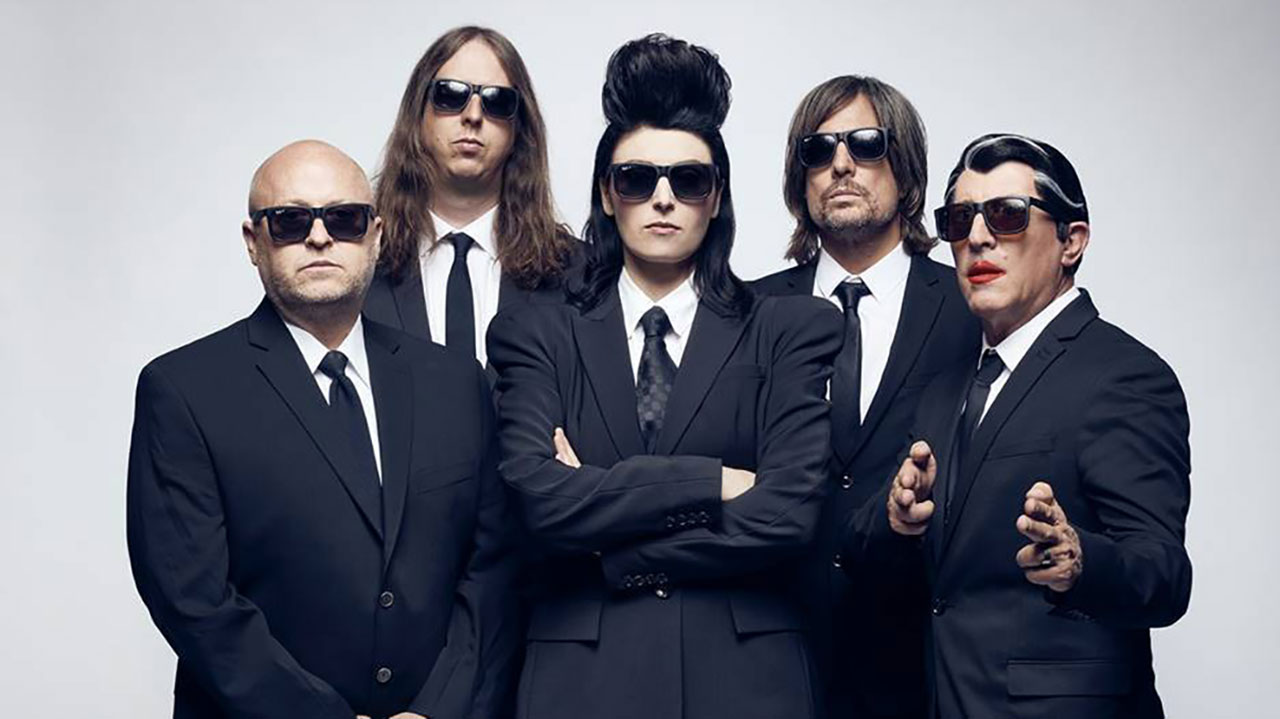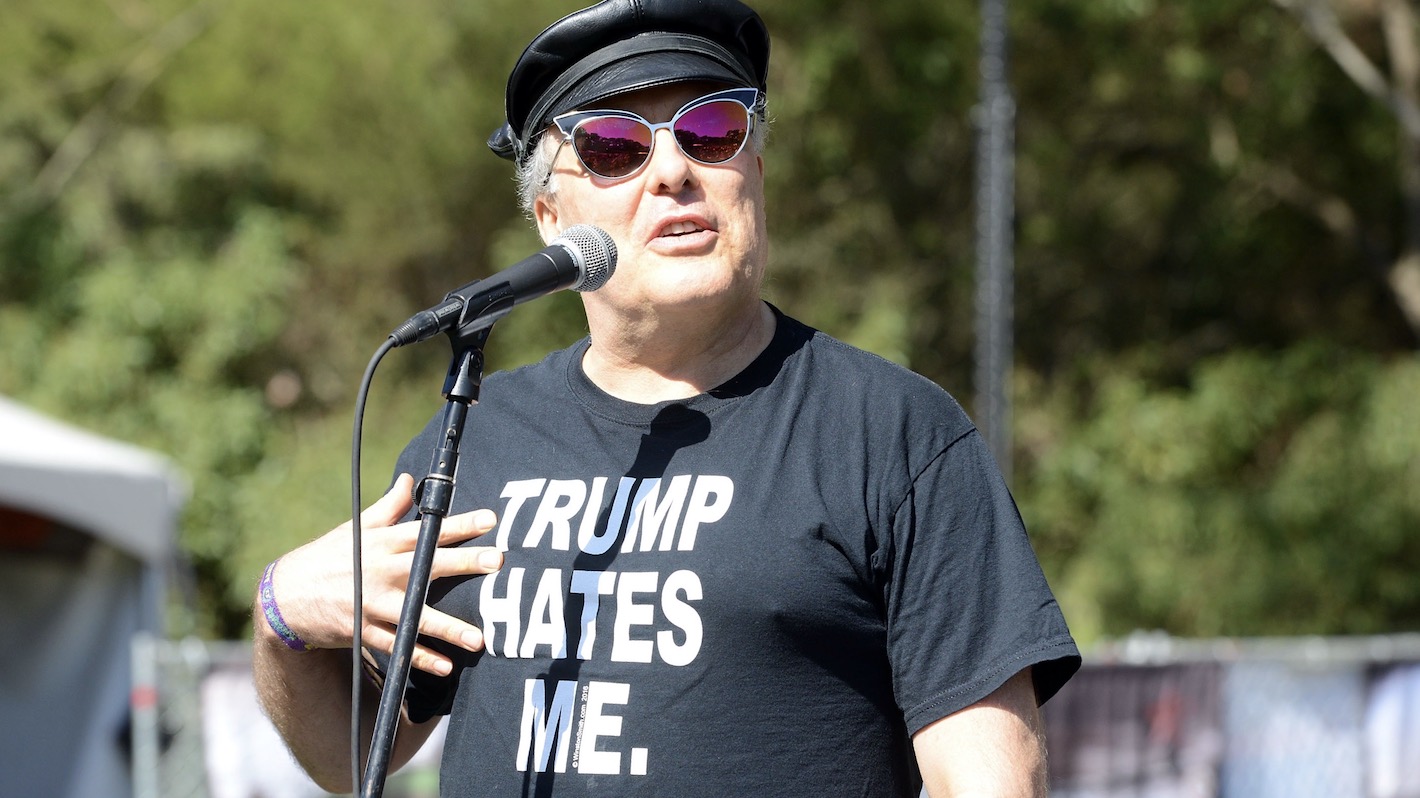Puscifer: “We can get swallowed in the burning hellfire of social media or we can take a step back”
Puscifer’s Maynard James Keenan and Carina Round reveal all about their new album, Existential Reckoning

Tool’s touring commitments may have been cancelled, and he might have contracted COVID-19 earlier this year, but Maynard James Keenan isn’t one to sit around doing nothing. Bringing forward work on fourth Puscifer album Existential Reckoning, we now get to hear it in all its synthesiser-driven glory. Started well before the pandemic, it nevertheless captures the zeitgeist, and looks at how our disconnected society might be able to find a way through. We caught up with Maynard in Arizona, and co-conspirator/vocalist Carina Round in Los Angeles, to find out more.

- Tool: The birth of the band
- Watch Maynard James Keenan wrestle a stage invader to the ground and sit on him for 10 minutes
- Tool: the story behind Prison Sex
- The 100 greatest metal albums of the 21st century
How did you start work on Existential Reckoning?
Maynard: “Mat [Mitchell, guitar/production] was all excited. About four-and-a-half years ago, he had picked up one of the few remaining, functional Fairlights, along with a bunch of other outboard gear and synthesisers. And he started really focusing on the Fairlight, trying to get some sound out of it. So as we were wrapping up the [2015 album] Money Shot tour, he was diving right into putting a folder together of little pieces. Over ’16, ’17, ’18, I was kind of listening a little bit, but it wasn’t until about the beginning of ’19 that I went, ‘Okay, I’m going to get in and start picking a few that we can start really digging into.”
How do you generally work?
Maynard: “I normally identify a couple of pieces, and then he’ll come out during harvest. I’ll do some vocals, and we just kind of chip away. We assume we’re going to try to do 10, maybe 14 tracks. So he’ll come out every couple of weeks, or I’ll go out there for a couple of days, to Los Angeles. At that same time, we have Carina there, so she’s usually listening to what I’m doing, and how I’m reacting to the track, and then her gears start turning on how she’s going to add her piece. It’s kind of a three-way chess match.”
Carina: “We all kind of working remotely at first. The studio that Mat and I work in is here in LA, and then of course Maynard’s, for the most part, over in Arizona. And so I work in the studio with Mat, but we’re in separate rooms doing our own thing, and then every now and then, we drive to Arizona. Whenever we need a change of scenery, or to be in that environment which is a little more aggressive or hostile, and to have the 360-degree view of the beautiful mountains, and use that energy to create something with the three of us.”

The first thing you released from Existential Reckoning was Apocalyptical. Although you’d written the song before the pandemic, you had a video featuring a guy in a Hazmat suit. How did you come up with the concept?
Sign up below to get the latest from Metal Hammer, plus exclusive special offers, direct to your inbox!
Maynard: “A lot of stuff that happens with us, is we’re reacting to what we’re seeing. And we’ve been working with the digital ninja, Meats Meier. He’s incredible with his 3D space and his filming techniques. And I guess the benefit of the shutdown was that there was no way he could have done that video, in a Hazmat suit, around Los Angeles, without a pandemic. The streets were empty. That was one of those things, you see it, and you go, ‘Ooh! Grab that, because you’re never going to see that again, probably not in our lifetimes’. So he went out and got that footage, immediately.”
And then there’s the bit at the end when you’re giving him the toilet roll, which is very 2020!
Maynard: “Well yeah, I mean, that’s kind of our icon now, right? There’s many little icons that have popped up in this particular year. But tigers are one, toilet paper’s another… there’s a few.”
Carina: “I wasn’t involved with that at all. I mean, if someone had asked me, ‘What’s the perfect video that could be made right now during this lockdown to this song, I would have probably said exactly that video. All the time I was just thinking, ‘God, I wish somebody was really documenting how empty these cities are.’ It was eerie. At the beginning of the lockdown, it was so creepy, and elicited such a strange, unexpected emotional reaction in me. Especially walking into the store and just shelves being devastated by people, empty of anything. It was just… apocalyptical. And then of course there’s the gag about toilet paper at the end. It’s just the exact expression of what was happening in that moment. And we had to do it separately; this is why it’s green screened. Everything about that video was perfect, for the time.”
It feels like you’re exploring more about digital disconnection this time out. Is that fair to say?
Maynard: “Well, I feel like social media and the internet has really kind of driven a wedge, in between people. So that’s definitely come up, since social media has kind of taken off.”
Carina: “I think what happened was Twitter. Obviously Twitter does not create the personality of a human being. But it certainly magnifies the positive and the negative, but negative sells, so the algorithm will give us a negative, and then that just creates this feedback loop of hatred and anger and extremism. And I just think, we’re living in an age right now where we’re just discovering the consequences, really, of social media. We’ve had it for a while, and now it’s just reaching this peak, and we’re starting to realise what it does to people psychologically. And we can either just get swallowed up in the burning hellfire of it, quite frankly, or we can take a step back.”
The album sounds quite sci-fi, and the artwork features aliens. Where did that come from?
Maynard: “I’ve been working a little bit with some wine labels, with the local artists. Well he’s not local, he’s international, but he’s based out of Tucson, Arizona. His name is Daniel Martin Diaz. And it just seemed to fit; we were working with him on a couple of other projects, and I kind of had an idea to go to him and go, ‘What would you do with these ideas?’ and that’s what he came back with. So it made the cut, and it made the album art.”
And what about in terms of the sound? Was there anything sci-fi going on there with you as a group?
Maynard: “No, I think it’s just those sounds coming off that Fairlight and coming off those synthesisers that lends itself to that direction. If were to start with a drum machine and a banjo and a mandolin, you would get a completely different record. You might get something like [2011 album] Conditions Of My Parole. It’s just all kind of where you start. What’s the sound you’re starting with, is the cornerstone. And then watch where you go with those sounds leading you.”
Is being in Puscifer fun?
Carina: “Yeah, it’s so fun. It’s ultimate fun, ideal fun. To say that I’m sharing a platform with people like Maynard and Mat, and then the cast of musicians that work with us, and to feel like I’m bringing something important to that, and making important music, and then getting to go onstage and dress like that, and perform like that, which is as important to me as making things, it’s just like a… I feel like if someone had asked me as a five-year-old, what my ideal situation would be, this would be it. This is really appealing to me inner child, hahaha! To my subconscious performer. It’s really fun.”
Maynard: “Yeah, it’s an interesting collaboration with the way we all work together. We build on each other and listen to each other. I think it’s great, because we all have our little control issues – everybody does that makes art – but I feel like we’ve found a balance for letting go of that control, and just signing on for the ride.”

Eleanor was promoted to the role of Editor at Metal Hammer magazine after over seven years with the company, having previously served as Deputy Editor and Features Editor. Prior to joining Metal Hammer, El spent three years as Production Editor at Kerrang! and four years as Production Editor and Deputy Editor at Bizarre. She has also written for the likes of Classic Rock, Prog, Rock Sound and Visit London amongst others, and was a regular presenter on the Metal Hammer Podcast.
